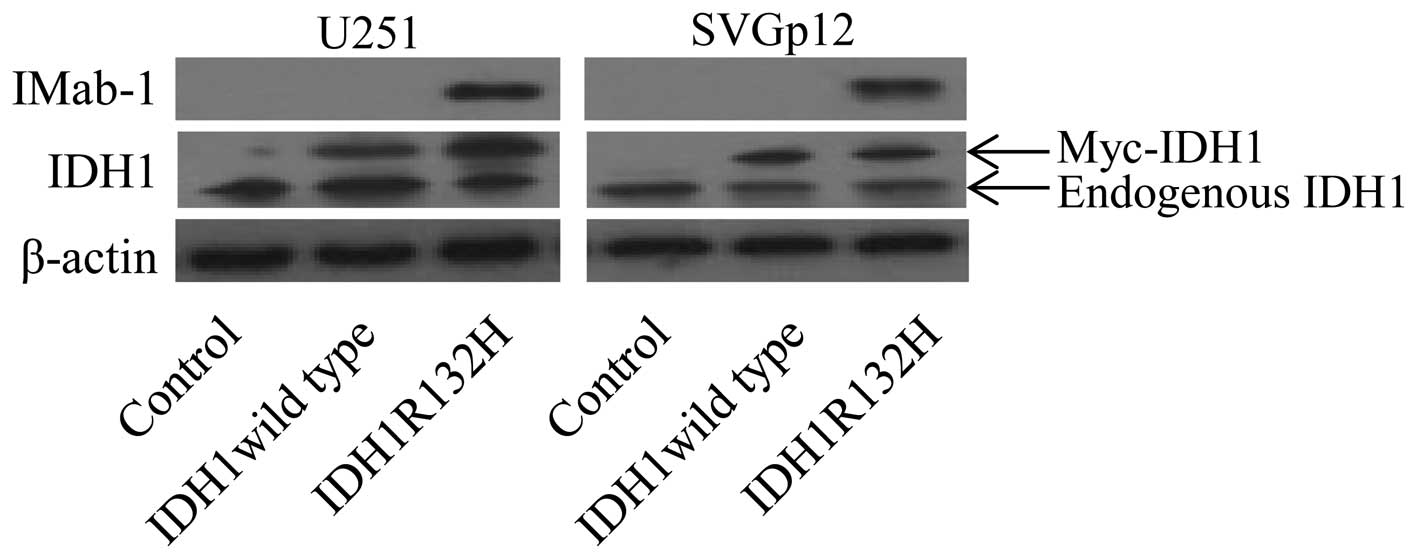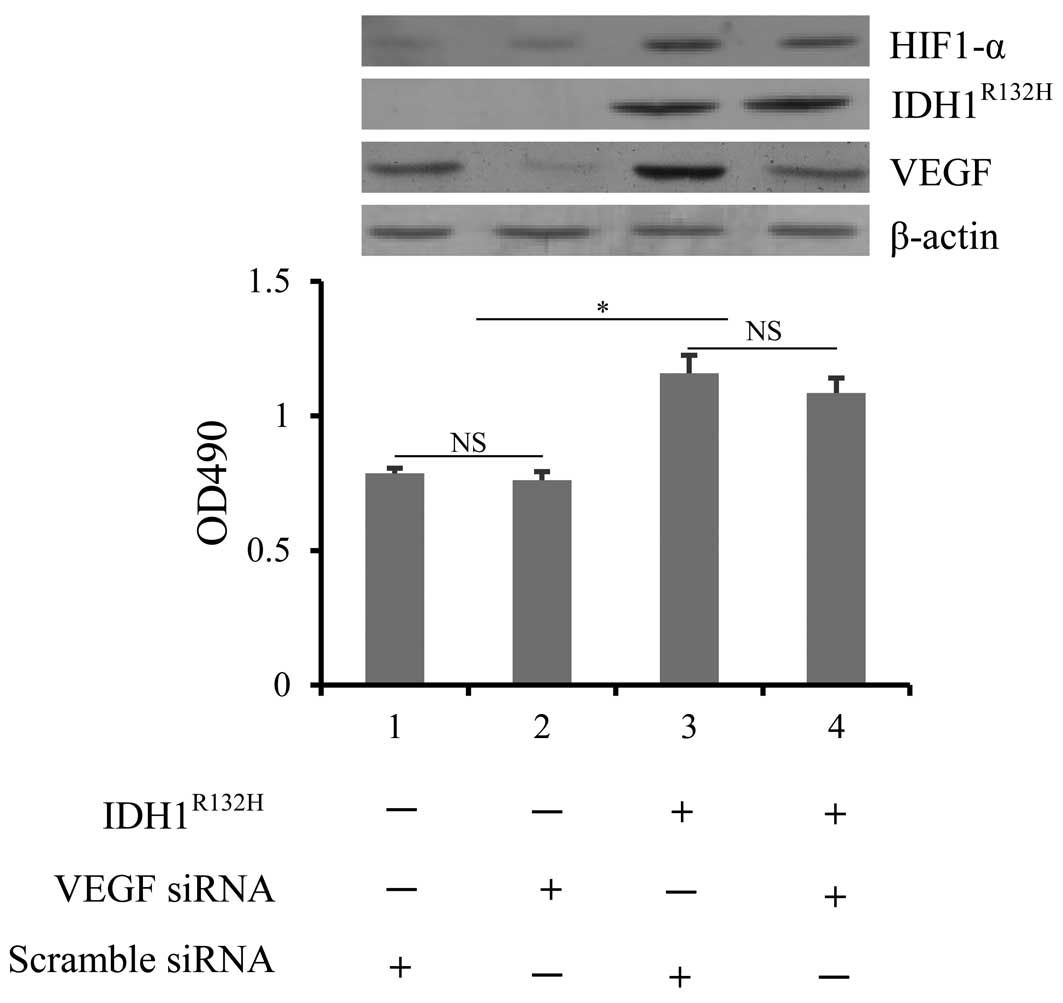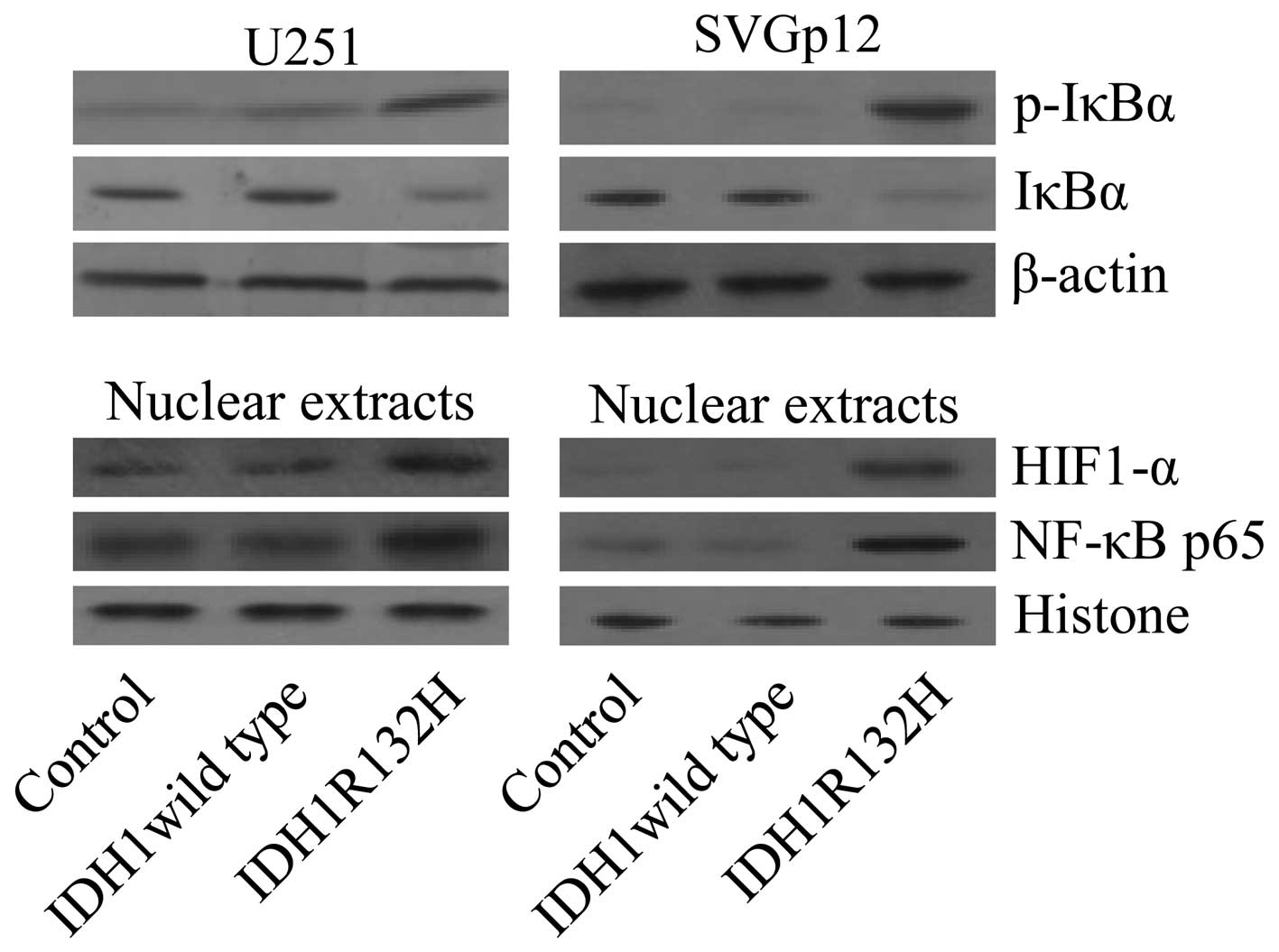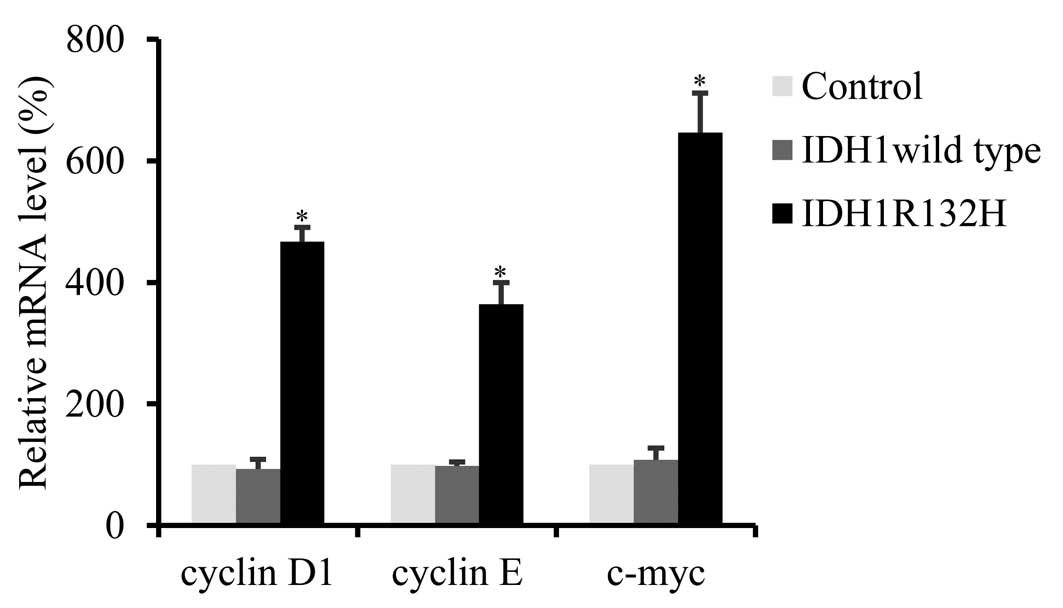|
1
|
Parsons DW, Jones S, Zhang X, et al: An
integrated genomic analysis of human glioblastoma multiforme.
Science. 321:1807–1812. 2008. View Article : Google Scholar : PubMed/NCBI
|
|
2
|
Balss J, Meyer J, Mueller W, et al:
Analysis of the IDH1 codon 132 mutation in brain tumors. Acta
Neuropathol. 116:597–602. 2008. View Article : Google Scholar : PubMed/NCBI
|
|
3
|
Watanabe T, Nobusawa S, Kleihues P and
Ohgaki H: IDH1 mutations are early events in the development of
astrocytomas and oligodendrogliomas. Am J Pathol. 174:1149–1153.
2009. View Article : Google Scholar : PubMed/NCBI
|
|
4
|
Yan H, Parsons DW, Jin G, et al: IDH1 and
IDH2 mutations in gliomas. N Engl J Med. 360:765–773. 2009.
View Article : Google Scholar : PubMed/NCBI
|
|
5
|
Ichimura K: Molecular pathogenesis of IDH
mutations in gliomas. Brain Tumor Pathol. 29:131–139. 2012.
View Article : Google Scholar : PubMed/NCBI
|
|
6
|
Ramachandran N and Colman RF: Chemical
characterization of distinct subunits of pig heart DPN-specific
isocitrate dehydrogenase. J Biol Chem. 255:8859–8864.
1980.PubMed/NCBI
|
|
7
|
Ichimura K, Pearson DM, Kocialkowski S, et
al: IDH1 mutations are present in the majority of common adult
gliomas but rare in primary glioblastomas. Neuro Oncol. 11:341–347.
2009. View Article : Google Scholar : PubMed/NCBI
|
|
8
|
Hartmann C, Hentschel B, Wick W, et al:
Patients with IDH1 wild type anaplastic astrocytomas exhibit worse
prognosis than IDH1-mutated glioblastomas, and IDH1 mutation status
accounts for the unfavorable prognostic effect of higher age:
implications for classification of gliomas. Acta Neuropathol.
120:707–718. 2010. View Article : Google Scholar
|
|
9
|
Zhao S, Lin Y, Xu W, et al: Glioma-derived
mutations in IDH1 dominantly inhibit IDH1 catalytic activity and
induce HIF-1α. Science. 324:261–265. 2009.PubMed/NCBI
|
|
10
|
Dang L, White DW, Gross S, et al:
Cancer-associated IDH1 mutations produce 2-hydroxyglutarate.
Nature. 462:739–744. 2009. View Article : Google Scholar : PubMed/NCBI
|
|
11
|
Sahm F, Capper D, Pusch S, et al:
Detection of 2-hydroxyglutarate in formalin-fixed paraffin-embedded
glioma specimens by gas chromatography/mass spectrometry. Brain
Pathol. 22:26–31. 2012. View Article : Google Scholar : PubMed/NCBI
|
|
12
|
Hughes JM, Groot AJ, van der Groep P, et
al: Active HIF-1 in the normal human retina. J Histochem Cytochem.
58:247–254. 2010. View Article : Google Scholar : PubMed/NCBI
|
|
13
|
Semenza GL: Targeting HIF-1 for cancer
therapy. Nat Rev Cancer. 3:721–732. 2003. View Article : Google Scholar
|
|
14
|
Mardis ER, Ding L, Dooling DJ, et al:
Recurring mutations found by sequencing an acute myeloid leukemia
genome. N Engl J Med. 361:1058–1066. 2009. View Article : Google Scholar : PubMed/NCBI
|
|
15
|
Taylor CT: Interdependent roles for
hypoxia inducible factor and nuclear factor-κB in hypoxic
inflammation. J Physiol. 586:4055–4059. 2008.
|
|
16
|
Walmsley SR, Farahi N, Peyssonnaux C, et
al: Hypoxia-induced neutrophil survival is mediated by
HIF-1α-dependent NF-κB activity. J Exp Med. 201:105–115. 2005.
|
|
17
|
Bruning U, Fitzpatrick SF, Frank T, et al:
NFkappaB and HIF display synergistic behaviour during hypoxic
inflammation. Cell Mol Life Sci. 69:1319–1329. 2012. View Article : Google Scholar : PubMed/NCBI
|
|
18
|
Koong AC, Chen EY and Giaccia AJ: Hypoxia
causes the activation of nuclear factor kappa B through the
phosphorylation of I kappa B alpha on tyrosine residues. Cancer
Res. 54:1425–1430. 1994.
|
|
19
|
Kenneth NS and Rocha S: Regulation of gene
expression by hypoxia. Biochem J. 414:19–29. 2008. View Article : Google Scholar : PubMed/NCBI
|
|
20
|
Cummins EP and Taylor CT:
Hypoxia-responsive transcription factors. Pflugers Arch.
450:363–371. 2005. View Article : Google Scholar : PubMed/NCBI
|
|
21
|
Laver T, Nozell S and Benveniste EN: The
NF-κB signaling pathway in GBMs: implications for apoptotic and
inflammatory responses and exploitation for therapy. CNS Cancer,
Cancer Drug Discovery and Development. Van Meir EG: Springer; pp.
1011–1036. 2009
|
|
22
|
Gilmore TD: Introduction to NF-kappaB:
players, pathways, perspectives. Oncogene. 25:6680–6684. 2006.
View Article : Google Scholar : PubMed/NCBI
|
|
23
|
Perkins ND: The Rel/NF-kappa B family:
friend and foe. Trends Biochem Sci. 25:434–440. 2000. View Article : Google Scholar : PubMed/NCBI
|
|
24
|
Perkins ND and Gilmore TD: Good cop, bad
cop: the different faces of NF-kappaB. Cell Death Differ.
13:759–772. 2006. View Article : Google Scholar : PubMed/NCBI
|
|
25
|
Livak KJ and Schmittgen TD: Analysis of
relative gene expression data using real-time quantitative PCR and
the 2(−Delta Delta C(T)) Method. Methods. 25:402–408. 2001.
|
|
26
|
Lee CH, Jeon YT, Kim SH and Song YS:
NF-kappaB as a potential molecular target for cancer therapy.
Biofactors. 29:19–35. 2007. View Article : Google Scholar : PubMed/NCBI
|
|
27
|
Sethi G, Sung B and Aggarwal BB: Nuclear
factor-kappaB activation: from bench to bedside. Exp Biol Med
(Maywood). 233:21–31. 2008. View Article : Google Scholar : PubMed/NCBI
|
|
28
|
Van Waes C: Nuclear factor-kappaB in
development, prevention, and therapy of cancer. Clin Cancer Res.
13:1076–1082. 2007.PubMed/NCBI
|
|
29
|
Reitman ZJ and Yan H: Isocitrate
dehydrogenase 1 and 2 mutations in cancer: alterations at a
crossroads of cellular metabolism. J Natl Cancer Inst. 102:932–941.
2010. View Article : Google Scholar : PubMed/NCBI
|
|
30
|
Dolcet X, Llobet D, Pallares J and
Matias-Guiu X: NF-κB in development and progression of human
cancer. Virchows Arch. 446:475–482. 2005.
|
|
31
|
Scortegagna M, Cataisson C, Martin RJ, et
al: HIF-1alpha regulates epithelial inflammation by cell autonomous
NFkappaB activation and paracrine stromal remodeling. Blood.
111:3343–3354. 2008. View Article : Google Scholar : PubMed/NCBI
|
|
32
|
Cockman ME, Lancaster DE, Stolze IP, et
al: Posttranslational hydroxylation of ankyrin repeats in IkappaB
proteins by the hypoxia-inducible factor (HIF) asparaginyl
hydroxylase, factor inhibiting HIF (FIH). Proc Natl Acad Sci USA.
103:14767–14772. 2006. View Article : Google Scholar
|
|
33
|
Cummins EP, Berra E, Comerford KM, et al:
Prolyl hydroxylase-1 negatively regulates IkappaB kinase-beta,
giving insight into hypoxia-induced NFkappaB activity. Proc Natl
Acad Sci USA. 103:18154–18159. 2006. View Article : Google Scholar : PubMed/NCBI
|
|
34
|
Ghosh S and Karin M: Missing pieces in the
NF-kappaB puzzle. Cell. 109(Suppl): S81–S96. 2002. View Article : Google Scholar : PubMed/NCBI
|
|
35
|
Hayden MS and Ghosh S: Shared principles
in NF-kappaB signaling. Cell. 132:344–362. 2008. View Article : Google Scholar : PubMed/NCBI
|
|
36
|
Abdullah JM, Ahmad F, Ahmad KA, et al:
Molecular genetic analysis of BAX and cyclin D1 genes in patients
with malignant glioma. Neurol Res. 29:239–242. 2007. View Article : Google Scholar : PubMed/NCBI
|
|
37
|
Arato-Ohshima T and Sawa H:
Over-expression of cyclin D1 induces glioma invasion by increasing
matrix metalloproteinase activity and cell motility. Int J Cancer.
83:387–392. 1999. View Article : Google Scholar : PubMed/NCBI
|
|
38
|
Zhang X, Zhao M, Huang AY, et al: The
effect of cyclin D expression on cell proliferation in human
gliomas. J Clin Neurosci. 12:166–168. 2005. View Article : Google Scholar : PubMed/NCBI
|
|
39
|
Liao DJ, Thakur A, Wu J, Biliran H and
Sarkar FH: Perspectives on c-Myc, cyclin D1, and their interaction
in cancer formation, progression, and response to chemotherapy.
Crit Rev Oncog. 13:93–158. 2007. View Article : Google Scholar : PubMed/NCBI
|
|
40
|
Robson S, Pelengaris S and Khan M: c-Myc
and downstream targets in the pathogenesis and treatment of cancer.
Recent Pat Anticancer Drug Discov. 1:305–326. 2006. View Article : Google Scholar : PubMed/NCBI
|
|
41
|
Nobusawa S, Watanabe T, Kleihues P and
Ohgaki H: IDH1 mutations as molecular signature and predictive
factor of secondary glioblastomas. Clin Cancer Res. 15:6002–6007.
2009. View Article : Google Scholar : PubMed/NCBI
|
|
42
|
Houillier C, Wang X, Kaloshi G, et al:
IDH1 or IDH2 mutations predict longer survival and response to
temozolomide in low-grade gliomas. Neurology. 75:1560–1566. 2010.
View Article : Google Scholar : PubMed/NCBI
|
|
43
|
SongTao Q, Lei Y, Si G, et al: IDH
mutations predict longer survival and response to temozolomide in
secondary glioblastoma. Cancer Sci. 103:269–273. 2012. View Article : Google Scholar : PubMed/NCBI
|
|
44
|
Lee SM, Koh HJ, Park DC, et al: Cytosolic
NADP(+)-dependent isocitrate dehydrogenase status modulates
oxidative damage to cells. Free Radic Biol Med. 32:1185–1196.
2002.
|
|
45
|
Rohle D, Popovici-Muller J, Palaskas N, et
al: An inhibitor of mutant IDH1 delays growth and promotes
differentiation of glioma cells. Science. 340:626–630. 2013.
View Article : Google Scholar : PubMed/NCBI
|




















